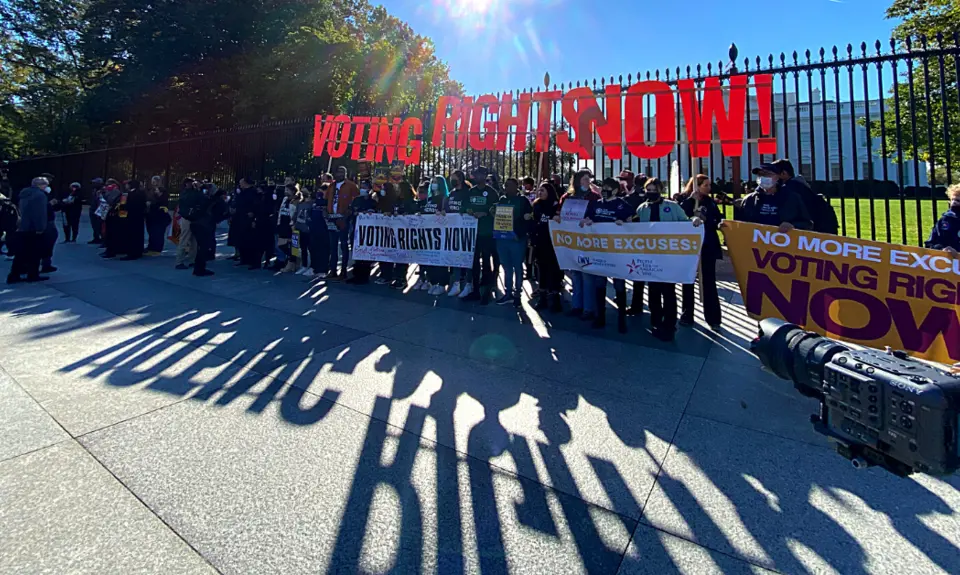After almost a year of public pressure on President Biden and the Senate from People For and our allies, and multiple filibusters from Republicans, we finally had our first public debate in the Senate on voting rights legislation during Biden’s presidency. On January 18th and 19th, the Senate began debating the Freedom to Vote: John R. Lewis Act. It was made possible by a procedural maneuver engineered by Majority Leader Schumer and Speaker Pelosi that combined the previously separate bills into one message sent from the House to the Senate.
A large majority of the Democratic caucus spoke in favor of the legislation, while no Republicans supported the measure. The Democrats pragmatically and passionately laid out the case for the legislation and the importance of every eligible American being able to have access to the ballot and that vote being counted. They detailed the history of voter suppression and possible election subversion, and the need for filibuster reform in order to get this legislation passed. Only with a rules change would the Senate be able to close debate and vote on the bill without first passing a 60-vote threshold.
“I’ve been here since January of 2013. This is the first time since then that we’ve been able to get a bill on the floor to talk about voting rights…” “This is not a partisan bill even if you Republicans won’t stand up for it,” said Senator Tim Kaine (D-VA).
“We shouldn’t act like it’s not a big deal. It’s a huge deal.” [voter suppression] “If we disenfranchise enough people from the polls, we won’t have a democracy to talk about,” said Senator John Tester (D-MT).
“I haven’t met anybody who thinks their voice is meaningfully represented in the United States Senate” stated Senator Michael Bennet (D-CO).
The filibuster has “evolved from a procedural tool into a weapon,” said Senator Debbie Stabenow (D-MI).
“Now is the time for the Senate to have courage. To debate as we are now and then to vote…We need to have national standards [for voting],” said Senator Ben Cardin (D-MD).
In the weeks and days leading up to the debate, most Democrats publicly shored up their support for a narrow Senate rules change such that the bill could pass, circumventing any filibuster. Ultimately, despite floor speeches and behind-the-scenes negotiations, Senators Sinema and Manchin voted with the Republicans against the rules change, denying The Freedom to Vote: John R. Lewis Act the support needed to overcome a Republican filibuster.
However, the fight for voting rights is far from over. As Senator Schumer, who courageously called the question on the historic and moral question of protecting our fundamental right to vote, said when he addressed the Senate floor on Thursday after the rules change vote failed:
While last night’s vote was disappointing, it will not deter Senate Democrats from continuing our fight against voter suppression, dark money, partisan gerrymandering. Democrats are proud of the fight we held last night…
Facing an uphill battle from the state, we lost the vote. But to have not voted would have been a far greater loss: a loss for our Democratic Party – which for generations has stood for voting rights -a loss for the civil rights advocates who have sacrificed so much on this issue, and a loss for the American people and what this country stands for. On an issue this important, not doing everything we could would have been unacceptable…
Now the bromides of the beltway class hold we should not have held a vote on voting rights if the outcome was not certain. They are wrong. Imagine telling Dr. King not to march from Selma to Montgomery because he could not be sure what obstacles awaited him and his fellow freedom fighters. Imagine telling John Lewis he should have never crossed the Pettus Bridge, because it was unclear what perils awaited
him on the other side.Every member of this body who has ever invoked these great titans of freedom has an obligation – an obligation – to uphold their legacies not just with words but with actions. Senators were elected to vote.
As we regroup and discuss strategy moving forward, one thing remains clear: the fight to protect our democracy will go on, and we will persevere in the end.
